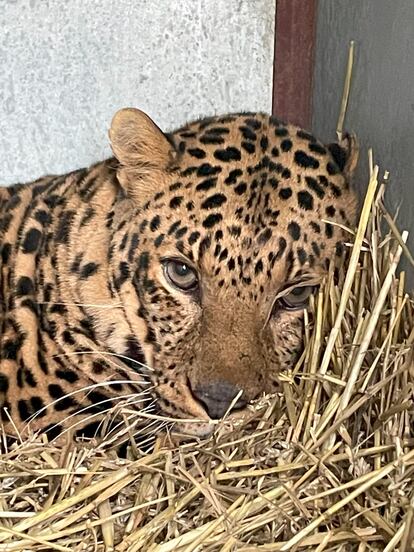Brave, a malnourished leopard found in Ukraine, recovers in Spain
The wild animal was found abandoned in a private house in a war zone and transferred to a rescue and rehabilitation center in Alicante

Brave should have lived in the savanna. His nails allow him to climb trees with vertical trunks. His tail affords him the balance necessary for great leaps when hunting. His fur acts as camouflage. But this leopard lived far from its natural habitat in a private house in Ukraine where he never climbed so much as a log.
A local association found him abandoned without food and water in the middle of Ukraine’s war with Russia. Subsequent collaboration with AAP, the international foundation for recovering and rehabilitating wild animals in Europe, has given the leopard a new home 3,000 kilometers away, in its Spanish branch, Primadonus in Villena, Alicante. “He was thin when he was found,” says Berta Alzaga, head of communication at the AAP Primadonus center. “He had skin problems, poor fur, and there was neither food nor water available for the animal in the house.” Brave will never be able to be returned to the wild, but he will be able to overcome the trauma of war and a life of confinement.
“Captivity can lead to disturbed animals,” adds Alzaga, who explains that Brave’s recovery will take time. The Ukrainian association Wild Animal Rescue moved the leopard to a field shelter at the end of last year, where the animal spent two months almost without moving and always in hiding, thereby remaining malnourished and dehydrated. Eventually, the volunteers contacted Primadonus to have him transferred to their larger and more specialized facilities in Villena.
The first thing Brave did when he arrived at the center on November 24 was to run and hide under some wooden structures. The day after, he changed shelters and ate, but was still in hiding. “The animals that have lived through these situations arrive stressed and totally distrustful,” says Alzaga. “They move slowly when they begin to recognize the space they have.” Alzaga adds that they are frightened by movement and, above all, by noise, because “in all likelihood, they have been hearing bombs go off.”
According to Alzaga, “Captivity and contact with people cause wild animals to develop psychological and physical problems.” In Villena, there are now 30 wild cats and 70 primates in rehabilitation. AAP is basically financed by donations and relies on volunteers. Of Dutch origin, it has branches in the Netherlands, Spain and Germany and rescue centers in Villena and Almere in the Netherlands.
Private ownership
The rescued animals at Primadonus often come “from private ownership, illegal trafficking or entertainment, especially circuses” — all limiting environments that have made “their development deficient while encouraging aberrant behaviors.” Their owners sometimes lock them up or abandon them because they have either attacked them or their environment. But confinement can also cause them to tear out their own hair, bite or injure themselves. “Captivity generates disturbed animals,” Alzaga explains.
Brave will spend a month in quarantine in a space of 50 square meters, before he recovers in a facility of 1,200 square meters with trees, rocks and other features resembling those of his natural habitat. There he will begin a long journey: it is not only a matter of getting him used to the new space, but also of working on his physical development in a way that will allow him to act as he would in the savanna — or at least as closely to it as possible.
Brave will not hunt in Primadonus but, as part of his muscle-rehabilitation, he will have to climb steps, jump, stand up on his hind legs and stretch to access food. And, if at some point a female arrives at the center, he will be able to socialize and live in a group. What is clear is that rehabilitation requires patience, time, movement and autonomy. “It’s not a two-day thing,” says Alzaga.
Sign up for our weekly newsletter to get more English-language news coverage from EL PAÍS USA Edition
Tu suscripción se está usando en otro dispositivo
¿Quieres añadir otro usuario a tu suscripción?
Si continúas leyendo en este dispositivo, no se podrá leer en el otro.
FlechaTu suscripción se está usando en otro dispositivo y solo puedes acceder a EL PAÍS desde un dispositivo a la vez.
Si quieres compartir tu cuenta, cambia tu suscripción a la modalidad Premium, así podrás añadir otro usuario. Cada uno accederá con su propia cuenta de email, lo que os permitirá personalizar vuestra experiencia en EL PAÍS.
¿Tienes una suscripción de empresa? Accede aquí para contratar más cuentas.
En el caso de no saber quién está usando tu cuenta, te recomendamos cambiar tu contraseña aquí.
Si decides continuar compartiendo tu cuenta, este mensaje se mostrará en tu dispositivo y en el de la otra persona que está usando tu cuenta de forma indefinida, afectando a tu experiencia de lectura. Puedes consultar aquí los términos y condiciones de la suscripción digital.








































